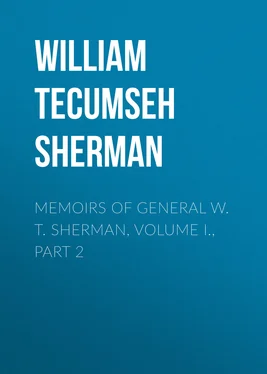William Tecumseh Sherman - Memoirs of General W. T. Sherman, Volume I., Part 2
Здесь есть возможность читать онлайн «William Tecumseh Sherman - Memoirs of General W. T. Sherman, Volume I., Part 2» — ознакомительный отрывок электронной книги совершенно бесплатно, а после прочтения отрывка купить полную версию. В некоторых случаях можно слушать аудио, скачать через торрент в формате fb2 и присутствует краткое содержание. Жанр: Биографии и Мемуары, История, foreign_edu, foreign_antique, foreign_prose, на английском языке. Описание произведения, (предисловие) а так же отзывы посетителей доступны на портале библиотеки ЛибКат.
- Название:Memoirs of General W. T. Sherman, Volume I., Part 2
- Автор:
- Жанр:
- Год:неизвестен
- ISBN:нет данных
- Рейтинг книги:3 / 5. Голосов: 1
-
Избранное:Добавить в избранное
- Отзывы:
-
Ваша оценка:
- 60
- 1
- 2
- 3
- 4
- 5
Memoirs of General W. T. Sherman, Volume I., Part 2: краткое содержание, описание и аннотация
Предлагаем к чтению аннотацию, описание, краткое содержание или предисловие (зависит от того, что написал сам автор книги «Memoirs of General W. T. Sherman, Volume I., Part 2»). Если вы не нашли необходимую информацию о книге — напишите в комментариях, мы постараемся отыскать её.
Memoirs of General W. T. Sherman, Volume I., Part 2 — читать онлайн ознакомительный отрывок
Ниже представлен текст книги, разбитый по страницам. Система сохранения места последней прочитанной страницы, позволяет с удобством читать онлайн бесплатно книгу «Memoirs of General W. T. Sherman, Volume I., Part 2», без необходимости каждый раз заново искать на чём Вы остановились. Поставьте закладку, и сможете в любой момент перейти на страницу, на которой закончили чтение.
Интервал:
Закладка:
During the afternoon General Sherman informed the writer that a council of war was to be held immediately in his private room in the hotel, and desired him to be present at the council. General Sherman and the writer proceeded directly to the room. The writer entered the room first, and observed in it Mr. Cameron, Adjutant-General L. Thomas, and some other persons, all of whose names he did not know, but whom he recognized as being of Mr. Cameron's party. The name of one of the party the writer had learned, which he remembers as Wilkinson, or Wilkerson, and who he understood was a writer for the New York Tribune newspaper. The Hon. James Guthrie was also in the room, having been invited, on account of his eminent position as a citizen of Kentucky, his high civic reputation, and his well-known devotion to the Union, to meet the Secretary of War in the council. When General Sherman entered the room he closed the door, and turned the key in the lock.
Before entering on the business of the meeting, General Sherman remarked substantially: "Mr. Cameron, we have met here to discuss matters and interchange views which should be known only by persons high in the confidence of the Government. There are persons present whom I do not know, and I desire to know, before opening the business of the council, whether they are persons who may be properly allowed to hear the views which I have to submit to you." Mr. Cameron replied, with some little testiness of manner, that the persons referred to belonged to his party, and there was no objection to their knowing whatever might be communicated to him.
Certainly the legitimate and natural conclusion from this remark of Mr. Cameron's was that whatever views might be submitted by General Sherman would be considered under the protection of the seal of secrecy, and would not be divulged to the public till all apprehension of injurious consequences from such disclosure had passed. And it may be remarked, further, that justice to General Sherman required that if, at any future time, his conclusions as to the amount of force necessary to conduct the operations committed to his charge should be made public, the grounds on which his conclusions were based should be made public at the same time.
Mr. Cameron then asked General Sherman what his plans were. To this General Sherman replied that he had no plans; that no sufficient force had been placed at his disposition with which to devise any plan of operations; that, before a commanding general could project a plan of campaign, he must know what amount of force he would have to operate with.
The general added that he had views which he would be happy to submit for the consideration of the Secretary. Mr. Cameron desired to hear General Sherman's views.
General Sherman began by giving his opinion of the people of Kentucky, and the then condition of the State. He remarked that he believed a very large majority of the people of Kentucky were thoroughly devoted to the Union, and loyal to the Government, and that the Unionists embraced almost all the older and more substantial men in the State; but, unfortunately, there was no organization nor arms among the Union men; that the rebel minority, thoroughly vindictive in its sentiments, was organized and armed (this having been done in advance by their leaders), and, beyond the reach of the Federal forces, overawed and prevented the Union men from organizing; that, in his opinion, if Federal protection were extended throughout the State to the Union men, a large force could be raised for the service of the Government.
General Sherman next presented a resume of the information in his possession as to the number of the rebel troops in Kentucky. Commencing with the force at Columbus, Kentucky, the reports varied, giving the strength from ten to twenty thousand. It was commanded by Lieutenant-General Polk. General Sherman fixed it at the lowest estimate; say, ten thousand. The force at Bowling Green, commanded by General. A. S. Johnston, supported by Hardee, Buckner, and others, was variously estimated at from eighteen to thirty thousand. General Sherman estimated this force at the lowest figures given to it by his information—eighteen thousand.
He explained that, for purposes of defense, these two forces ought, owing to the facility with which troops might be transported from one to the other, by the net-work of railroads in Middle and West Tennessee, to be considered almost as one. General Sherman remarked, also, on the facility with which reinforcements could be transported by railroad to Bowling Green, from the other rebellions States.
The third organized body of rebel troops was in Eastern Kentucky, under General Zollicoffer, estimated, according to the most reliable information, at six thousand men. This force threatened a descent, if unrestrained, on the blue-grass region of Kentucky, including the cities of Lexington, and Frankfort, the capital of the State; and if successful in its primary movements, as it would gather head as it advanced, might endanger the safety of Cincinnati.
General Sherman said that the information in his possession indicated an intention, on the part of the rebels, of a general and grand advance toward the Ohio River. He further expressed the opinion that, if such advance should be made, and not checked, the rebel force would be swollen by at least twenty thousand recruits from the disloyalists in Kentucky. His low computation of the organized rebel soldiers then in Kentucky fixed the strength at about thirty-five thousand. Add twenty thousand for reenforcements gained in Kentucky, to say nothing of troops drawn from other rebel States, and the effective rebel force in the State, at a low estimate, would be fifty-five thousand men.
General Sherman explained forcibly how largely the difficulties of suppressing the rebellion would be enhanced, if the rebels should be allowed to plant themselves firmly, with strong fortifications, at commanding points on the Ohio River. It would be facile for them to carry the war thence into the loyal States north of the river.
To resist an advance of the rebels, General Sherman stated that he did not have at that time in Kentucky more than some twelve to fourteen thousand effective men. The bulk of this force was posted at camp Nolin, on the Louisville & Nashville Railway, fifty miles south of Louisville. A part of it was in Eastern Kentucky, under General George H. Thomas, and a very small force was in the lower valley of Green River.
This disposition of the force had been made for the double purpose of watching and checking the rebels, and protecting the raising and organization of troops among the Union men of Kentucky.
Having explained the situation from the defensive point of view, General Sherman proceeded to consider it from the offensive stand-point. The Government had undertaken to suppress the rebellion; the onus faciendi, therefore, rested on the Government. The rebellion could never be put down, the authority of the paramount Government asserted, and the union of the States declared perpetual, by force of arms, by maintaining the defensive; to accomplish these grand desiderata, it was absolutely necessary the Government should adopt, and maintain until the rebellion was crushed, the offensive.
For the purpose of expelling the rebels from Kentucky, General Sherman said that at least sixty thousand soldiers were necessary. Considering that the means of accomplishment must always be proportioned to the end to be achieved, and bearing in mind the array of rebel force then in Kentucky, every sensible man must admit that the estimate of the force given by General Sherman, for driving the rebels out of the State, and reestablishing and maintaining the authority of the Government, was a very low one. The truth is that, before the rebels were driven from Kentucky, many more than sixty thousand soldiers were sent into the State.
Читать дальшеИнтервал:
Закладка:
Похожие книги на «Memoirs of General W. T. Sherman, Volume I., Part 2»
Представляем Вашему вниманию похожие книги на «Memoirs of General W. T. Sherman, Volume I., Part 2» списком для выбора. Мы отобрали схожую по названию и смыслу литературу в надежде предоставить читателям больше вариантов отыскать новые, интересные, ещё непрочитанные произведения.
Обсуждение, отзывы о книге «Memoirs of General W. T. Sherman, Volume I., Part 2» и просто собственные мнения читателей. Оставьте ваши комментарии, напишите, что Вы думаете о произведении, его смысле или главных героях. Укажите что конкретно понравилось, а что нет, и почему Вы так считаете.












